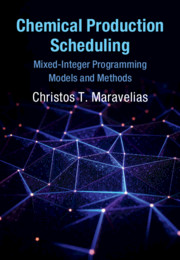Part II - Basic Methods
Published online by Cambridge University Press: 01 May 2021
Summary

- Type
- Chapter
- Information
- Chemical Production SchedulingMixed-Integer Programming Models and Methods, pp. 65 - 190Publisher: Cambridge University PressPrint publication year: 2021

